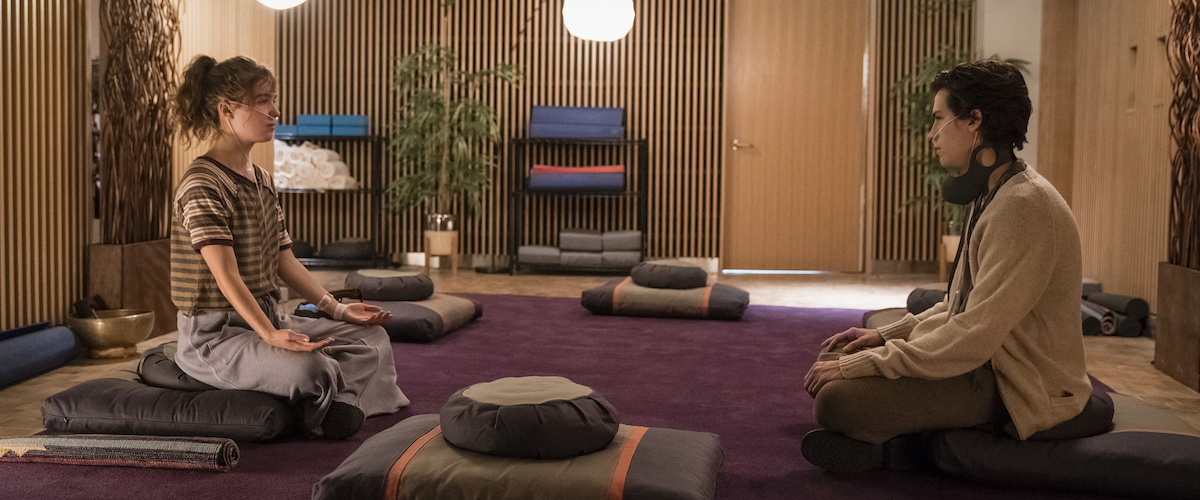Take a breath. Take a deep breath. Those of us who have the luxury of taking breathing for granted get to choose when we think about drawing air into our lungs—to center our thoughts, to relax, to sing, to blow up a balloon, to run. For people with lung diseases like cystic fibrosis (CF), every breath is a struggle, a triumph, and a painful reminder that it may be the last.
Just a few decades ago, the life expectancy for those born with CF was 10. So it is only recently that people like the teenagers with CF in “Five Feet Apart” lived long enough to truly understand their disease and their limitations.
Stella (a radiant Haley Lu Richardson) checks into the hospital for help with an infection as though it is her second home. The medical staff are all old friends, especially Barb (Kimberly Hebert Gregory), a compassionate nurse. Stella knows all the routines and she knows what to bring for comfort, including her stuffed panda, the laptop she uses for her vlog updates about living with CF, and the pictures from her bedroom wall.
Stella knows that her best case scenario, a lung transplant, may only work for five years, but in the CF medical relay race, the best case scenario is always just to last long enough for better treatment to be invented.
In the meantime, Stella knows that her best coping mechanisms are feeling in control of her “regimen” of care, organizing the meds cart, taking her pills with chocolate pudding, and visiting the babies in the neonatal intensive care unit.
Her best friend Poe (Moises Arias) is back in the hospital, too. And so is Will (Cole Sprouse) another teenage CF patient, there to receive an experimental drug. While Stella is ultra, even hyper-cooperative in her treatment, hoping to be able to get the lung transplant, Will is a cynic and a rebel, in part because his prognosis is not as hopeful. Even if the medication is successful, the B-cepacia infection has made him ineligible for a transplant. Stella presses him to keep up with his regimen, and he agrees if she will let him draw her.
Love stories always have to have a reason to keep the couple apart and in this case, that means literally apart. Because of their vulnerability to infection, CF patients have to stay at least six feet from each other. They are like Romeo and Juliet if the Montagues were bacteria and the Capulets were a set of new lungs.
Latex gloves, no touching, and six feet between them at all times. As Stella falls for Will she says, “After all CF has taken from me, I don’t mind stealing one foot back.” And so they have a date, still within the walls of the hospital (apparently hospitals have swimming pools) using a five-foot pool cue to measure their distance. And then, because they are teenagers, they take some very big risks.
It is tempting to dismiss this story as “sick-lit” but director Justin Baldoni balances the compelling specifics of CF with the larger questions we all face about creating meaning in a world of uncertainty and loss. And he does it with two gifted and appealing young stars, especially Richardson, whose exquisitely expressive face shows us every hope, fear, hesitation, regret, and longing Stella is feeling.
Baldoni clearly learned a great deal from his “My Last Days” television series documenting the lives of terminally ill people, including a teenager with CF, and he shows sensitivity and insight in exploring these issues within a fictional story. He makes the most of the way he uses the hospital setting, the atrium lobby with its drab, sturdy institutional furniture. As Stella and Will fall in love, it seems warmed by their tenderness and excitement.
Even healthy young people can die. Illness can devastate families, emotionally and financially. It is scary to love someone and it can be even scarier to let someone love you, especially when you are embarrassed by your scars. We all try to find a way to feel in control of something, whether it is by lining up pill boxes on a meds cart and doing what we are told or by putting an “Abandon all hope ye who enter here” sign on a hospital door and ignoring good advice. “We don’t have time for delicacy,” one character says, in their case because they may not live a “normal” lifespan, but in reality, films like this remind us we could all do better at making sure we get the most from the time we have.




















